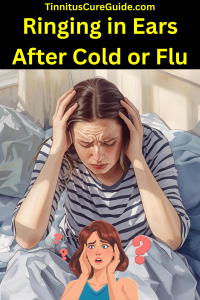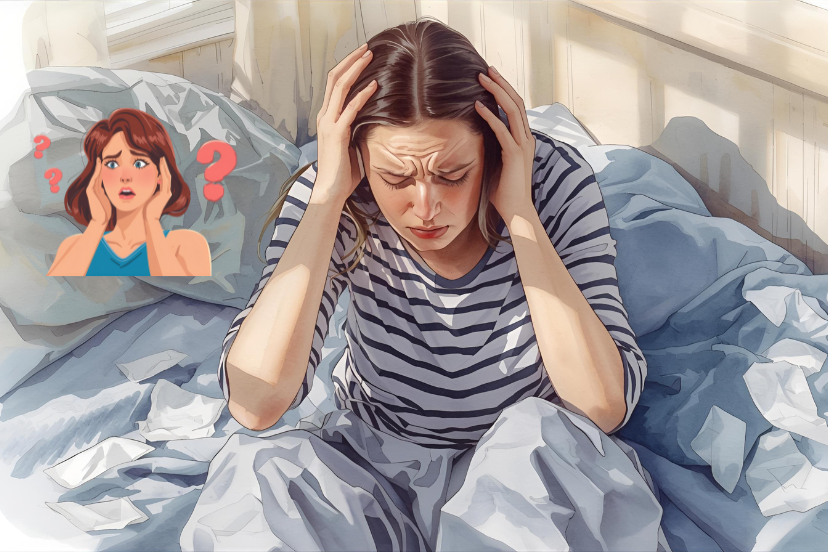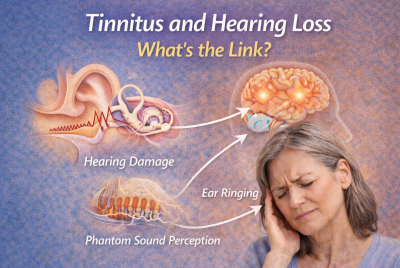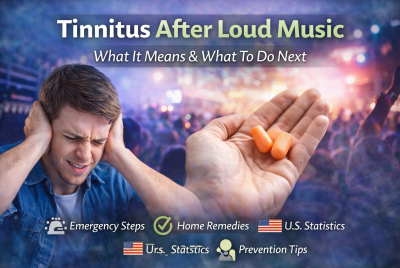Ringing in Ears After Cold or Flu: Causes, Relief, and Prevention
Why Does the Ringing Start After a Cold or Flu?
If you’ve ever battled a tough cold or flu, you know the misery doesn’t always end when the fever and congestion clear. Many people notice ringing in ears after cold or flu, often described as buzzing, whooshing, or a high-pitched noise that won’t go away. For some, this is temporary, while for others it lingers, raising questions about whether it’s tinnitus.
You’re not alone—millions of Americans report tinnitus symptoms after respiratory illnesses each year. But what causes this ear ringing, and more importantly, how can you make it stop? Let’s break it down.
What Causes Ringing in Ears After Cold or Flu?
1. Sinus Pressure and Congestion
A cold or flu often clogs the sinuses, causing swelling that affects the Eustachian tube, which connects the middle ear to the back of the throat. When this tube can’t regulate pressure properly, fluid buildup or blockage can trigger ear ringing.
2. Middle Ear Infections
Colds and flu can lead to otitis media (middle ear infection). This infection can cause fluid buildup, ear buzzing sounds, and even temporary hearing loss alongside ringing.
3. Inflammation of the Auditory Pathway
Viral infections sometimes inflame the nerves linked to hearing. Even after the infection clears, this irritation may leave behind temporary tinnitus symptoms like whooshing in ears or high-pitched ringing.
4. Fever and Dehydration Effects
High fever and dehydration strain the body, including the delicate inner ear structures. This can worsen pre-existing chronic tinnitus or trigger new symptoms.
How Long Does Ringing in Ears After Cold or Flu Last?
-
Short-term tinnitus: For most people, symptoms fade within a week or two as congestion clears.
-
Persistent ringing: If ear ringing continues longer than three weeks, it could indicate lingering infection, ear damage, or underlying tinnitus.
-
Seek care if: The ringing is paired with dizziness, hearing loss, or pain, as these may suggest complications needing medical treatment.
Symptoms That Often Accompany Ear Ringing After Illness
-
Ear fullness or pressure
-
Muffled hearing or temporary hearing loss
-
Constant or intermittent buzzing sound
-
Whooshing in the ears when bending forward
-
Discomfort or pain if infection is present
Home Remedies for Ringing in Ears After Cold or Flu
1. Steam Inhalation
Breathing in steam helps clear sinus congestion and may relieve pressure on the Eustachian tube.
2. Warm Compress
A warm cloth placed over the ear can ease discomfort and improve fluid drainage.
3. Hydration and Rest
Staying hydrated helps thin mucus, while rest supports faster recovery from viral illness.
4. OTC Decongestants
Products like pseudoephedrine (Sudafed) or nasal sprays may reduce sinus swelling and relieve pressure-related ear buzzing sounds.
5. White Noise for Tinnitus Relief
If the ringing keeps you up at night, a white noise machine or app can mask the high-pitched ear noise.
Medical Treatments and When to See a Doctor
-
Antibiotics: If a bacterial ear infection is present.
-
Steroid nasal sprays: Reduce sinus inflammation and prevent fluid buildup.
-
Hearing aids with sound masking: Beneficial if ringing becomes chronic.
-
ENT evaluation: Important if ringing persists beyond three weeks or worsens.
Prevention Tips for Avoiding Ear Ringing After Cold or Flu
While you can’t always avoid catching a cold or flu, there are steps you can take to reduce the chances of developing ringing in ears after cold or flu. Protecting your ear and sinus health not only helps prevent tinnitus symptoms but also supports your overall well-being.
1. Strengthen Your Immune System
A strong immune system makes you less likely to develop severe sinus congestion that contributes to ear ringing. Focus on:
-
Eating fruits and vegetables high in vitamin C, zinc, and antioxidants.
-
Getting at least 7–8 hours of sleep each night.
-
Regular physical activity, even light walking, can boost circulation and immunity.
2. Stay Hydrated
Adequate hydration keeps mucus thin, which helps prevent Eustachian tube blockages that trigger ear buzzing sounds. Aim for 8–10 glasses of water daily, especially during illness.
3. Manage Sinus and Allergy Issues
If you have seasonal allergies or chronic sinus problems, treating them promptly lowers your risk of tinnitus flare-ups. Consider:
-
Using saline nasal sprays.
-
Running a humidifier in dry climates or during winter.
-
Taking prescribed allergy medications as directed.
4. Protect Your Ears During Illness
When you’re already congested, your ears are more vulnerable to noise damage. Avoid loud environments, concerts, or using earbuds at high volumes. Use hearing protection when needed.
5. Avoid Sudden Pressure Changes
Congestion makes your ears sensitive to pressure. If you must fly or drive through mountains while sick, try:
-
Chewing gum.
-
Using filtered earplugs for flying.
-
Practicing gentle swallowing or yawning to equalize pressure.
6. Reduce Stress Levels
Since the stress and tinnitus connection is well-documented, practicing relaxation techniques like deep breathing, meditation, or yoga can help prevent ear ringing from worsening during or after illness.
By consistently following these habits, you can minimize your chances of experiencing persistent ear ringing at night or long-term tinnitus symptoms after a cold or flu.
Coping Strategies if Ringing Persists
-
Try tinnitus sound therapy apps for daily relief.
-
Reduce caffeine and alcohol, as both may worsen ringing.
-
Practice relaxation techniques—stress and tinnitus connection is well-documented.
-
Explore natural tinnitus treatments like magnesium or ginkgo biloba (with doctor approval).
FAQs About Ringing in Ears After Cold or Flu
1. Why do I get ringing in my ears after a cold or flu?
Ringing in ears after a cold or flu often happens when congestion blocks the Eustachian tubes, causing pressure in the middle ear. This can create temporary tinnitus, which usually improves as sinus inflammation and mucus clear.
2. How long does ear ringing last after a cold?
For most people, ear ringing lasts a few days to two weeks after a cold. If symptoms continue beyond two weeks, worsen, or affect hearing, consult a doctor to rule out infection or underlying ear problems.
3. Can sinus infections cause ear ringing?
Yes. Sinus infections create swelling and pressure that can affect the ear canal and nerves, leading to ear ringing or buzzing. Treating the infection with decongestants, hydration, or antibiotics (if bacterial) often reduces tinnitus-related symptoms.
4. Should I see a doctor for ringing ears after the flu?
Yes, if ringing persists longer than two weeks, it is accompanied by hearing loss, dizziness, or severe pain. A doctor can check for complications like ear infections, fluid buildup, or chronic tinnitus requiring further evaluation.
5. What helps relieve ear ringing after being sick?
Relief strategies include staying hydrated, using saline nasal rinses, applying warm compresses, and trying sound therapy or white noise at night. Over-the-counter decongestants may also reduce pressure that contributes to temporary tinnitus after illness.
6. Can flu-related ear ringing become permanent tinnitus?
Most cases are temporary, but prolonged ear ringing after flu may lead to chronic tinnitus if ear damage or nerve irritation occurs. Protecting ears from loud noises and seeking treatment early helps reduce the long-term risk.
7. Does stress make ear ringing worse after a cold?
Yes. Stress increases awareness of tinnitus and may worsen symptoms after illness. Relaxation techniques like meditation, deep breathing, and light exercise can help lower stress levels and reduce the intensity of post-cold ear ringing.
Conclusion: Take Charge of Your Ear Health
Ringing in ears after cold or flu is usually temporary, caused by congestion or infection. Most people find relief within a few weeks through home remedies, rest, and over-the-counter treatments. But if the ringing lingers or worsens, don’t ignore it—an ENT specialist can rule out complications and guide you toward effective tinnitus remedies.
Disclaimer
This article is for educational purposes only and does not substitute for professional medical advice. Always consult with a qualified healthcare provider regarding any concerns about ear ringing or tinnitus symptoms.







